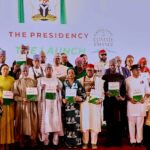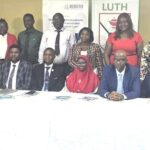By Lucy Ogalue
The United Kingdom and Nigeria are strengthening bilateral trade relations through a UK-funded programme that focuses on improving Nigeria’s quality infrastructure and helping local businesses meet international standards.
Dr Simeon Umukoro, Trade Market Access Lead for the UK Department for Business and Trade in Nigeria, said this during the presentation of the Standards Partnership Programme in Abuja on Thursday.
Umukoro said the initiative aimed to enhance Nigeria’s ability to access global markets, particularly the UK, by supporting local institutions and small and medium enterprises (SMEs).
Hec noted that the partnership aligned with the UK’s commitment under the Enhanced Trade and Investment Partnership (ETIP) with Nigeria.
He explained that the programme would enable Nigerian businesses, especially SMEs, to take advantage of the UK’s Developing Countries Trading Scheme, which allowed duty-free access to the UK market for over 3,500 Nigerian commodities.
“The Standards Partnership is not just for large industries. It is tailored to support SMEs in meeting the international requirements necessary to export their goods.
“We are setting up structures and building the capacity of Nigerian institutions like the Standards Organisation of Nigeria (SON) and the Nigeria National Accreditation System (NiNAS) to ensure products meet global specifications,” he said.
The trade market access lead also said that the programme worked directly with Nigeria’s National Quality Council and related institutions to implement the National Quality Policy.
He said this provided a unique framework for inter-agency coordination, which many countries lacked, allowing Nigeria to gain an edge in global trade.
He added that the Standards Partnership Programme, which began in 2022, was now in its third phase and would run until March 2026.
“The project currently targets four pilot sectors: leather, tea, cashew, and coffee.
“We are helping these sectors identify where the gaps lie in their ability to meet export standards, whether in metrology, accreditation or conformity assessment and working with stakeholders to close those gaps,” he said.
Umukoro revealed that international experts would be deployed to support Nigerian businesses directly, enhancing their competitiveness both at home and abroad.
Similarly, Mr Olalekan Omoniyi, Deputy Director, Standards Development, SON, described the partnership as instrumental in aligning stakeholders with the critical role of standards in trade and export promotion.
Omoniyi said the collaboration had helped SON identify key export products that required standardisation.
He noted that no country could effectively trade or achieve economic growth without a strong national quality infrastructure.
He expressed concern over the low value placed on standards in Nigeria, saying that the partnership was helping to change this mindset by raising awareness on the importance of standards and metrology.
Omoniyi disclosed that SON, as Nigeria’s national standards body, also hosts the scientific and industrial metrology components, and was working to strengthen procedures and frameworks that support both local compliance and international competitiveness.
In the same vein, the Director-General, Nigerian Institute of Leather and Science Technology (NILEST), Dr Awal Imam, said the standards partnership had significantly boosted efforts to reposition the leather sector for international competitiveness.
Imam, represented by Mr Badmos Tope, Assistant Registrar at the NILEST, said the programme had helped address infrastructural gaps and aligned the leather value chain with national and international policy frameworks.
He said that with proper implementation of the National Leather Policy, Nigeria’s leather industry could generate over 1 billion dollars by the end of 2025.
He stressed the need to discourage the local consumption of raw hide, known as ‘Ponmo’, which undermined the tanning industry.
He also called for compliance with standards that required hides to be processed to at least crust level before export.
According to him, transforming hides into finished leather products will boost foreign exchange earnings and create job opportunities for Nigerian youth.
The News Agency of Nigeria (NAN) reports that the Standards Partnership is part of the UK government’s broader effort to promote mutual prosperity by unlocking trade potential between Nigeria and the UK, while also safeguarding product quality and consumer safety within Nigeria. (NAN)(www.nannews.ng)
Edited by Deborah Coker












